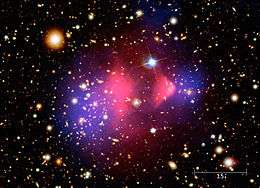LZ experiment
| LUX-Zeplin (LZ) experiment | |
| experiment | |
 | |
| Country | |
|---|---|
| State | |
| Nearest city | Rapid City |
| Location | one hour's drive from Rapid City |
| Website: The LZ Dark Matter Experiment | |
The LUX-Zeplin (LZ) experiment is a WIMP detector. The international collaboration constructing it formed in 2012 by combining the LUX and ZEPLIN groups. It is to be located at the Sanford Underground Research Facility (SURF) in South Dakota,[1] and managed by DOE’s Lawrence Berkeley National Lab (Berkeley Lab). The LZ experiment is a next-generation dark matter direct detection experiment. When completed, the experiment will be the world’s most sensitive experiment for WIMPs (Weakly Interacting Massive Particles) over a large range of WIMP masses[2] In the spring of 2015, LZ passed the ‘Critical Decision Step 1’ or CD-1 review, and became an official DOE project.[3]
LZ is a collaboration of 30 institutes in the US, UK, Portugal and Russia. Dr Henrique Araújo from the Imperial College of London leads the UK team on LZ.[4]
References
- ↑ LZ Lab Technician (Materials Laboratory Technician) HigherJobEd of "South Dakota School of Mines and Technology"
- ↑ Next-Generation Dark Matter Experiments Get the Green Light by Kate Greene in a press release of "Lawrence Berkeley National Laboratory" on July 15, 2014
- ↑ Welcome to the LZ dark matter experiment’s webpage
- ↑ New dark matter detector gets green light by Gail Wilson of "Imperial's News site" on 18 August 2014
